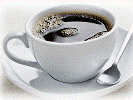
Coffee Drinkers Have Less Risk of Heart Rhythm Problems: AHA
Coffee drinkers may be less likely to be hospitalized for heart rhythm disturbances, according to a report presented at the American Heart Association’s 50th annual conference on Cardiovascular Disease Epidemiology and Prevention.
Researchers at the Kaiser Permanente Medical Care Program in Oakland, Calif., found that men and women who reported drinking four or more cups of coffee each day had an 18 percent lower risk of hospitalization for heart rhythm disturbances. Those who reported drinking one to three cups each day had a 7 percent reduction in risk.
The large, long-term observational study involved 130,054 men and women, 18 to 90 years old, with the majority less than 50 years old. About 2 percent (3,317) were hospitalized for rhythm disturbances; 50 percent of those were for atrial fibrillation, the most common heart rhythm problem.
The 18 percent reduction in risk was consistent among men and women, different ethnic groups, smokers and nonsmokers.
In the study, 14 percent reported drinking less than one cup of coffee a day; 42 percent reported drinking one to three cups; and 17 percent reported drinking four cups or more each day. Only 27 percent were not coffee drinkers.
“Coffee drinking is related to lower risk of hospitalization for rhythm problems, but this association does not prove cause and effect,” said Dr. Arthur Klatsky, study lead investigator and senior consultant in cardiology at the Kaiser Permanente Medical Care Program. “These data should be reassuring to people who drink moderate amounts of coffee that their habit is not likely to cause a rhythm disturbance.”
Researchers examined hospitalization data by elapsed time after the initial examination. For hospitalization within 10 years, the reduction in hospitalizations for people who consumed four cups of coffee or more each day reached 28 percent.
In another subgroup analysis, the researchers studied persons with and without symptoms or history of heart and respiratory disease. For both groups, four cups of coffee daily appeared to be associated with fewer hospitalizations for rhythm disturbances.
“This study does not mean that people should drink coffee to prevent rhythm problems,” Klatsky said. “It supports the idea that people who are at risk for rhythm problems or who have rhythm problems do not need to abstain from coffee.”
Because patients frequently report palpitations after drinking coffee, the public may be surprised at the study findings, Klatsky said.
This study was supported by a grant from the Kaiser Foundation Research Institute and the Robert Wood Johnson Foundation.